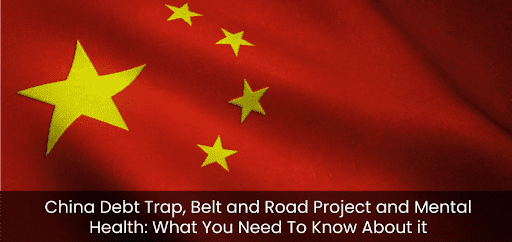Introduction
The Belt and Road project’s scale is unprecedented, with several nations joining it worldwide and more expected to join. Stakes on this project are very high, and the attention that B.R.I. has been drawing harsh criticism and visionary praises and dismissal.
Our Wellness Programs
What are China Debt Trap, Belt and Road Project
The Belt and Road project, announced in 2013, is Xi Jinping’s particular act for cementing his ambitions and his name in the history of China. Many argue that the B.R.I. (Belt and Road Initiative), which comes as a colossal endeavour, can either make or break the future of China.
While The Belt and Road project has garnered varied but sparse praises from heads of state, ministers, and pundits claiming that their respective countries are already reaping the advantages of B.R.I., the criticism has ultimately assembled into a single term: the China Debt Trap.
Looking for services related to this subject? Get in touch with these experts today!!
Experts

Banani Das Dhar

India
Wellness Expert
Experience: 7 years

Devika Gupta

India
Wellness Expert
Experience: 4 years

Trupti Rakesh valotia

India
Wellness Expert
Experience: 3 years

Sarvjeet Kumar Yadav

India
Wellness Expert
Experience: 15 years

Shubham Baliyan

India
Wellness Expert
Experience: 2 years
What Is the Chinese Economic Structure?
Deng Xiaoping introduced economic reforms to transform the Chinese economy into a socialist market economy. It is an economy where a dominant, state-owned business sector exists in coordination with private ownership and market capitalism. The constant and active encouragement of the private sector in China since 1978 has enabled the nation to jump-start its expansionary boom that is continuing even today. The private businesses in China now manufacture more than half of its G.D.P. and most of its exports. These private businesses in China also create the majority of the new jobs.
The economy of China has been rising irresistibly, with consequences and implications for everyone on varied levels. A few key messages to note about the economy of China are as follows:
- Reports suggest that the Chinese economy will slow down in 2022. In 2021, the real G.D.P. growth of the country reached 8.0%, and it moderated to 5.1% by the beginning of 2022. This slow-down reflects very little support from the exports and de-leveraging efforts of the government.
- There has been an increase in the downside risk to China’s economic outlook. Renewed cases of COVID-19 have disrupted economic activity to a great extent. A prolonged and severe downturn in the property sector of China poses another risk that could affect the economy on an extensive level.
Proper structural reforms can help with the rebalancing act of the economy of China. Mutually reinforcing policy options can help China mitigate the trade-offs and accelerate the transformation to top-quality growth.
Why Are Developing Countries Taking Loans from China?
China has enhanced its leverage on financially vulnerable states by giving them huge loans and has also ensnared some countries in sovereignty-eroding debt traps. But the question is, why are developing countries falling prey to China’s debt trap?
China is weaponising debt to expand its military, political, and economic presence worldwide.
- One of the primary reasons the developing countries fall prey to China’s debt trap is that instead of evaluating a country’s creditworthiness, China is too happy to lend money to them. China does not consider that new loans could saddle these countries with a burdensome debt crisis.
- At about 4%, the loans from China are very close to the commercial market rates. They are four times the typical number of loans from any country or the World Bank. Despite such enormous interest rates, the developing nations are borrowing from 3. China because the loan repayment period is shorter.
Another reason developing nations borrow money from China is that the state-owned lenders in China require the borrowers to maintain a minimum cash balance in their offshore accounts to which the lenders have access.
China Debt Trap, Belt and Road Project: China Rarely Uses Debt Trap Diplomacy in its Belt and Road Plan – True or False?
Critics of the Belt and Road Initiative accuse China of pursuing the debt trap policy, luring the developing countries into borrowing money to complete their infrastructure assignments. Thus, when they experience monetary problems, China can seize their assets and, thus, extend its military or strategic reach.
B.R.I. extends to 34 nations in Europe & Central Asia, 17 in North Africa & Middle East, 24 in East Asia, 6 in South Asia, 40 in Sub-Saharan Africa, and 19 in Latin America. As per reports by AidData, while China is providing financial assistance for the developmental assignments of over 100 low-income and middle-income nations, details about its loans and loaning deals are vague and secretive.
Vast portions of the loans given out by China do not find their place in the balance sheets of the central governments of the low-income and the L.M.I.C. s or middle-income countries. The state-owned companies in China are dealing with this money, and they are simultaneously benefitting from implicit and explicit forms of liability protection from the host government.
The reality is that B.R.I. has been implemented to connect China with nations worldwide financially, physically, socially, and digitally. The predatory loan policies of China have led to accusations levelled against the government for practising debt-trap diplomacy.
What Does the World Bank Say About China’s Loan Giving Plan?
According to the World Bank, China should improve its lending practices and maintain transparency in its loans, especially in developing nations. The World Bank also says it is working closely with China to motivate more openness in lending to developing countries.
Speaking at an occasion in Warsaw, David Malpass, the President of World Bank, laid down the details of China’s lending practices. He said China is one of the biggest creditors, especially developing nations. Of the official credit that has been offered to 75 low-income countries across the world, China owes almost 60% of it.
Further, the President appreciated that supply chain dependencies are decreasing, and thus, many nations are reducing their financial dependence on China. Though the World Bank President commended China’s rapid economic growth, he stressed that China should improve its lending practices.
How is mental health-related to China’s Debt Trap, Belt and Road Project
The Chinese argue that they are helping the developing nations by giving them capital and money they are not getting from the possible lending organisations. But the critics and other sources accuse China of deeply involving its partner countries in immeasurable debt. By doing so, China is trying to play with the authorities’ emotional, physical, financial, and mental health by taking over all their assets as collateral. As a result, more and more people face huge debt, causing anxiety, stress, and different health-related issues. And in such stressful situations, opting for therapy and counselling is ideal. Through these, experts try to understand the problem and give proper medications and guidance for the betterment of the people.
Conclusion
The B.R.I. is China’s way of getting poor and developing countries into its debt trap to extend control. But the path is not so simple for China, as sources and authorities are working toward making this policy of China a failed attempt for the country.
United We Care is an online wellness platform that understands the significance of mental health and therapy. Anyone, irrespective of their age and gender, can contact here from their home comfort and talk to professional therapists and counsellors to deal with their problems and lead a good life.
















